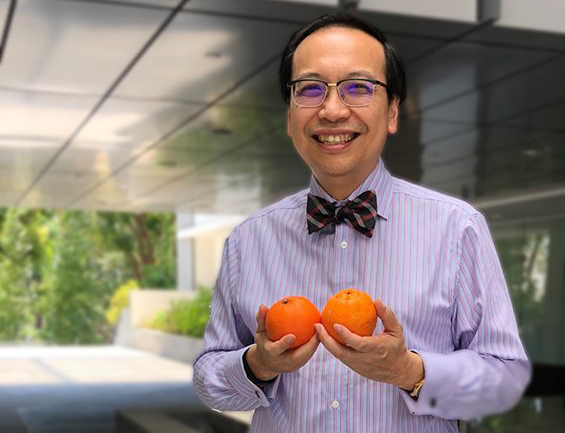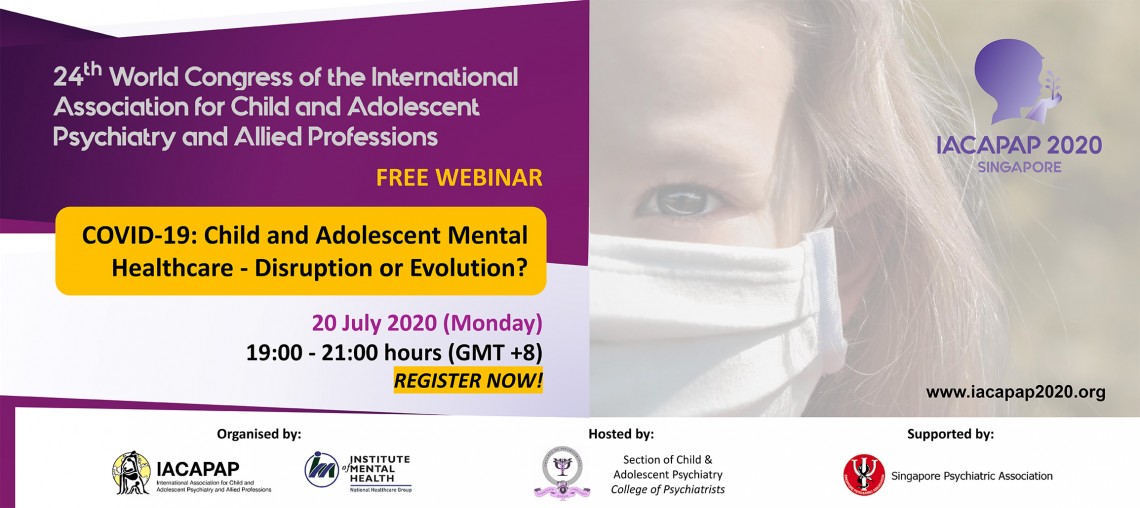IACAPAP President’s Message
The Sound of Music: Giving Voice to our Children
By Dr Daniel Fung, IACAPAP President, Adjunct Associate Professor, Lee Kong Chian School of Medicine Singapore

In these surreal times, as I sat down to pen my message for the next 3 months, I pondered on what that message should be about. My original plan for this year was to systematically take us through the aims and objectives of IACAPAP and what we should do in trying to approach these aims strategically from a long-term perspective. These would sandwich the June issue to focus on our biennial World Congress which would be celebrated in Singapore, itself celebrating its 50 years of child psychiatry and matched by a cycling event around our tiny island (similar to what the AACAP was doing with their Break the Cycle campaign). The COVID 19 pandemic gave me pause. It disrupted all the planning that our team had done. We scrambled to infection proof our services and braced ourselves for the rise of infected cases. In Singapore, we survived the first wave of infections coming from China relatively unscathed, however the second wave of infections was relentless creating outbreaks in various hotspots. The government moved the country into lockdown like many other cities around the world. Everything came to a standstill. Things slowed down yet moved quickly. Infection control measures were in full tilt. Business as usual became unusual. A new normal settled in. A new way of doing things. When we saw patients, we were both masked up. The therapeutic alliance was hampered by new barriers.
“Business as usual became unusual. A new normal settled in. A new way of doing things. When we saw patients, we were both masked up. The therapeutic alliance was hampered by new barriers.”
Then came the fears of an emotional epidemic driven by the anxiety and isolation with a looming economic recession. IACAPAP was reeling from these but we persevered, not just endured this lull. If there was to be a storm, we were prepared to ride it out. In fact, members responded to various calls to give voice, fly our masts and speak about child and adolescent mental health. My heart was warmed by the clarity of thought, careful consideration of circumstances and willingness to sacrifice time and effort across the world. These gave me hope and inspired me to think of our role in advocacy.
Child advocacy is traditionally focused on protecting children from abuse. This often focuses on physical protection. However, emotional resilience is just as important. Archbishop Desmond Tutu was attributed as saying “There comes a point where we need to stop just pulling people out of the river. We need to go upstream and find out why they’re falling in.” Advocacy does not have to be just creating awareness or making public statements. Advocacy is about giving a voice when it is hard to hear or that voices get drowned out by a whole lot of competing noises. I like to think of it as a form of providing support to children needing help, educating everyone, and creating a platform to share what we believe in. In child and adolescent mental health, we are faced with several challenges. Children, especially younger ones, often do need a voice louder than their own. Their issues are often clouded by the concerns of the families and communities they live in. Sometimes, there are political challenges to their needs as they have no political power and cannot vote. Then there is the problem of stigma and children’s mental illnesses though common and treatable often do not get adequate early attention.
“Advocacy does not have to be just creating awareness or making public statements. Advocacy is about giving a voice when it is hard to hear or that voices get drowned out by a whole lot of competing noises.”
How can we in IACAPAP help? How have we done it in the past. We have a long list of statements and declarations on our website (https://iacapap.org/declarations-statements/). Are these useful? We could just as well make these statements in the WHO general assembly as a WHO affiliated NGO, which we have. But what was the outcome? I think public statements are important stands that we can make but these need to be followed up with concrete actions. These then need discussion and planning followed by implementation. Advocacy means that we must start speaking to governments and spending time with policy makers to implement what needs to be done. IACAPAP has national associations as part of its membership and each association has a role for the country it represents. Some countries have more than one member. I know that in Singapore, the government often comes to our College (of Psychiatrists) for issues regarding mental illnesses and practice. If we all use this platform, we will be giving our children the voice they need. IACAPAP itself can support this effort by providing international relevance and amplify this voice even further. Like the songs, we all sing in unison on YouTube stating solidarity and support in the pandemic, we can sing with a single voice the importance of child and adolescent mental health and how it can be treated in every continent around the world.
___________________________________________________________________________________________________________________________________________________________
“What happens when the COVID-19 pandemic puts a damper on a world congress? We go digital!
The 24th World Congress of IACAPAP 2020 will now take place in the virtual world, tentatively planned for 2-4 December 2020 with details being finalised. In addition to the virtual 24th World Congress of IACAPAP 2020, there will be a complimentary webinar on 20 July 2020 (Singapore time 1900 – 2100 hrs, GMT +8) where a panel of experts will be discussing the impact of COVID-19 on child and adolescent mental health and care delivery. Webinar registration is FREE but virtual seats are limited! For registration details and information on the webinar and virtual conference, visit www.iacapap2020.org.”


